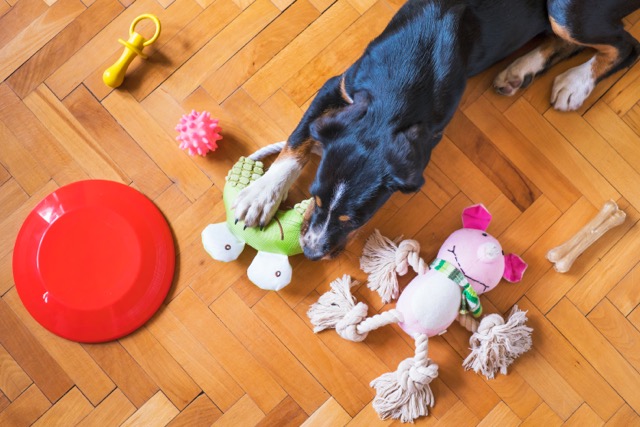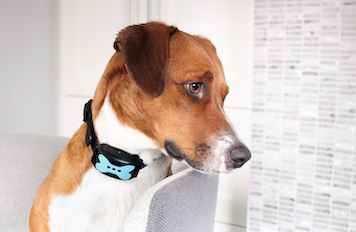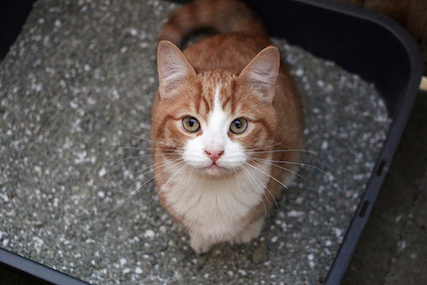Just like any other behavior, resource guarding is likely a combination of genetics, the puppy’s early environment, current environment, and individual learning history. One risk factor includes a puppy coming from a less-than-ideal environment where resources were scarce. Another, all too often, risk factor involves a young puppy being raised with an older dog who resource guards. Resource guarding in puppies is concerning because the behavior worsens with age and, as a puppy matures, the low-level guarding turns into aggression. If your young puppy is showing signs of resource guarding, you can do a few things to protect yourself, your family, and your puppy from the behavior strengthening.
Early signs of Resource Guarding
First, it is important to recognize some early signs of resource guarding. As a Certified Applied Animal Behaviorist, a few young puppy behaviors catch my attention and steer me toward an early intervention to treat resource guarding.
Extreme interest in toys or other items
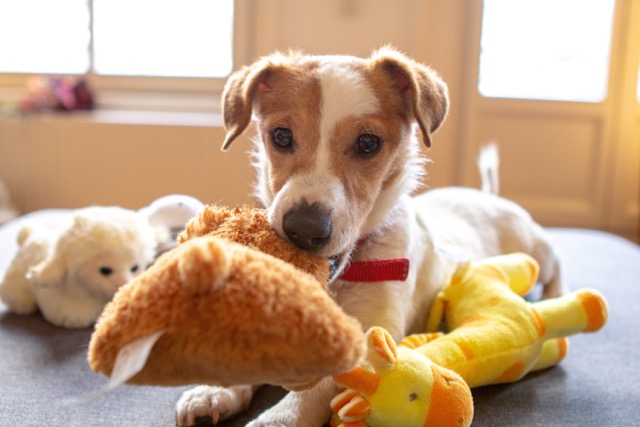
It’s important that puppies learn appropriate toy play, including interest in chew toys. Toy play helps to prevent excessive chewing and play-biting and is an important behavior to establish with puppies. For some, though, the interest in the toys is too strong. Extreme interest in chewing on toys can be an early sign of resource guarding.
A good measure of “extreme” is if your puppy is chewing on a bone or other toy and you enter the room; does your puppy come towards you? If you approach them, do they lift their head away from the toy? If the answer to both questions is “no” consider whether your puppy hunkers down over the toy as you approach, or do they simply continue chewing? Are their movements wiggly, or do they stiffen up as you approach? The same could extend to items in the yard: mulch, acorns, sticks, or leaves, to name a few.
As a CAAB, I have witnessed puppies incessantly pick up items outdoors such that it impacts their owner’s ability to walk them or allow them any freedom to potty outside. In those cases, I label the behavior as extreme. This extreme interest in toys or other items is an early sign of resource guarding.
Swallowing items whole
Another red flag includes a puppy swallowing items, including edible bones whole. This was a missed sign for me with my very first dog. I used to give her Greenies, and in the presence of other pets, she would swallow them whole! I missed the swallowing entirely and assumed another dog had stolen hers until one day, she regurgitated two giants Greenies completely undigested. Swallowing Greenies, edible Nylabones, pig ears, or any other edible item without chewing is an early sign of resource guarding. The same could be said for trash, yard waste, or other items your puppy picks up.
Hiding items
Sometimes resources are abundant in your puppy’s environment. Generally, environments with an overabundance are thought to discourage resource guarding, but the behavior can be present. When puppies pick up items and hide them, it can be a sign of early guarding. Sometimes puppies grab edible items and take them to their crate, covering them with blankets, or they might crawl under a bed and leave treasures in a place only they can reach. I have also seen puppies “cover” their food bowl using their nose and a scooping motion to bury the treasure. I have witnessed my dog as she scooped air onto her resources. Burying her food did not offer a modern-day benefit and is most likely a genetic, ritualistic behavior. After all, the air did not hide much! Nonetheless, hiding or attempting to hide items can be an early sign of resource guarding.
Ways to avoid Resource Guarding from developing
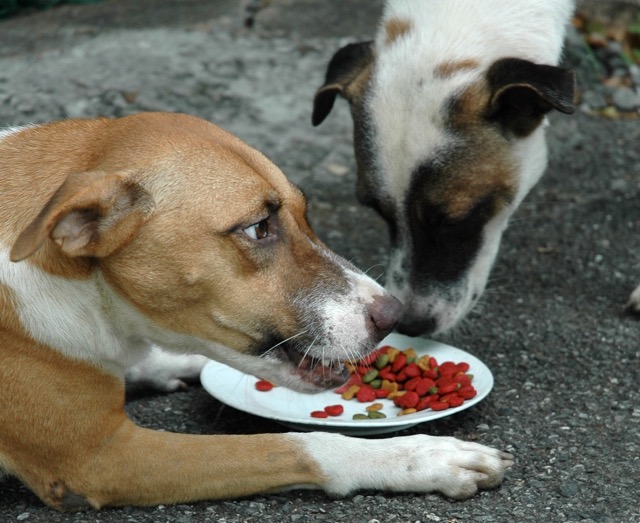
Resource guarding in puppies can be strengthened, if not started if owners overcorrect a puppy for picking up an inappropriate item or chewing. Normally, I recommend a verbal reprimand to punish inappropriate chewing in puppies. After using positive reinforcement to teach puppies what to and not to chew on, the verbal reprimand is delivered a handful of times. For some, appropriate toy play is not well established, the reprimand is delivered too early, and, as a result, becomes ineffective. If the reprimand persists beyond a handful of times, and an owner becomes a bit desperate to eliminate the behavior sometimes a harsh correction is introduced. If shock is introduced the threat of a puppy resource guarding skyrockets. These overcorrections for chewing support the development of resource guarding, if not nearly guarantee its development.
What to do if you see early signs of Resource Guarding
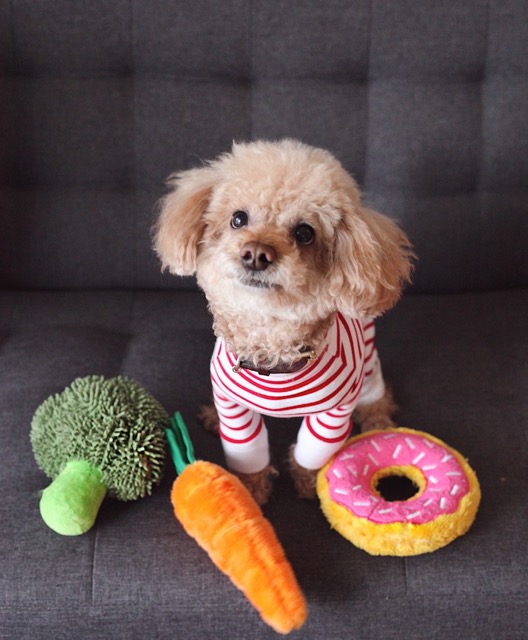
Exchanges with resources
If you begin to see signs that your puppy is resource-guarding, I recommend starting to exchange items they do not guard with a treat. Approach your puppy, take the item, feed them a treat, and return the item. This simple exercise teaches your puppy that good things happen to them when you approach. Instead of hunkering down to guard an item, they will begin to happily drop the item in anticipation as you approach. These exercises can be continued, and you can slowly increase the value of the item your puppy has access to.
Manage behavior around other pets
If your puppy shows signs of resource guarding around other pets, manage their behavior around mealtimes and avoid using edible bones (or toys filled with edible items) when around other pets. If you have an older dog in the home that guards resources from your puppy or other dogs, it is critical to manage their behavior. Feed meals separately and keep problematic items (e.g., food bins, trash cans) contained behind a closed space. These strategies help prevent your puppy from practicing and/or being exposed to resource guarding behavior.
Avoid some common training tips
Lastly, I avoid common training tips I normally recommend for puppies. I do not recommend hand feeding a puppy that shows signs of resource guarding because hand feeding can increase the value of the food, making a puppy even more likely to resource guard their meal. I also recommend against the use of food dispensing toys. When toys contain food, the toy’s value increases, making the toy more valuable and increasing the likelihood that your puppy will guard them. I also recommend putting any corrections for chewing on hold. Chewing will likely not improve, but this gives you time to begin the exchanges mentioned to combat some resource guarding.
Knowing the early signs and prevention is the key to preventing resource guarding in your puppy. If you notice your puppy does resource guard, use the steps above to reduce the behavior. I recommend contacting a professional in your area to help create and support a more individualized training program.
